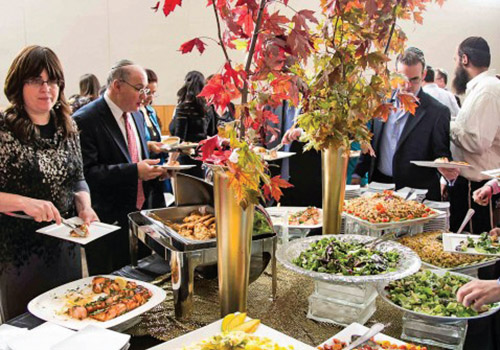

Everyone knows the excitement and anticipation felt before a big “shmorg.” Similarly, many can relate to the morning-after regrets of bloating, feeling stuffed and general discomfort caused by overindulging at such events. But kiddush goers and simcha attendees can take comfort in the fact that they are not alone in this struggle. The number of people who have sought out help for just this situation compelled integrative nutrition coach Gila Guzman of Main Asset Health, known to her clientele and throughout North Jersey as “Coach Gila,” to author a book addressing healthy choices at events, over Shabbos and during the holidays.
Coach Gila took a few minutes to share some tips with Jewish Link readers—a sneak preview so to speak—and help everyone at any step of a healthy eating journey incorporate healthy choices into some of the most challenging events (foodwise).
Establishing a healthy evening begins even before arriving at the event. While Guzman described the familiar “I won’t eat all day so I can save my calories for later” sentiment, the opposite advice is actually recommended. “Make sure to eat normally over the course of the day, but especially right before leaving to an event,” Coach Gila advised. The reason is twofold. First, this prevents the “big eyes” phenomenon of trying to eat everything at the buffet, and second, because food looks much more appealing on an empty stomach and it is harder to make educated, healthy choices this way. She recommended having a small snack of a lean protein, vegetable and healthy fat (for example, a hard-boiled egg, carrots and guacamole) prior to the event to have a satisfied feeling and not start out the simcha ravenous.
Even with a small snack beforehand, walking into a simcha and eyeing a mouthwatering smorgasboard is enough to forget any food resolutions. “Survey your choices first so you can prioritize what looks most appealing,” Guzman advised. “Don’t pick and add to your plate as you go. Fill a plate with what you want most. Not only does this allow you to choose your favorites over others, it also helps you keep track of what you eat.” So if someone prefers the sweet and sour meatballs over the General Tso’s chicken, now they know they don’t have to take both. (Or do they?)
Alcohol consumption is a hotly debated topic for many reasons, but for those trying to make healthy choices, alcohol can be a curve ball. Guzman acknowledged the fact that some people look forward to a drink at a simcha or social event. For someone who would like to have a drink, she advises alternating between seltzer and the drink, to reduce the impact of the alcohol as well as filling up on a healthier choice.
While these general guidelines can be helpful, Coach Gila also asserts that every person’s choices should be individually tailored, and there is no one way that is right for everyone. Some people follow a very disciplined approach and feel that any splurge will set them back. Others look forward to the one night of food indulgence as a “treat” to keep them on track the rest of the time. “It’s about staying aware of health goals and what will be best to keep someone there,” Guzman explained. “What matters most is the consistency, and being self aware.”
Coach Gila’s number one rule, whatever one decided to do at an event, and one she considers an important rule, is: “Whenever you are in a food situation that is out of your control, you need to remember—just because it is there, does not mean you need to eat it. But if you do decide you want it, mindfully enjoy it and move on without guilt.”
Hopefully these tips will help anyone looking to find a healthy solution. As Guzman writes on her website, “Being healthy doesn’t have to be hard.”
By Jenny Gans










